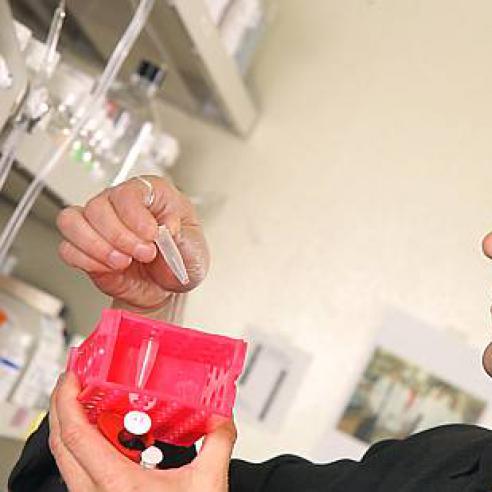Ocular Cancer

Michael A. Dyer, Ph.D., a Career Development awardee at the University of Tennessee Health Science Center, has developed novel therapeutic approaches for treating retinoblastoma, a debilitating childhood eye cancer
Some ocular (eye) cancers are primary cancers, meaning they start in the eye. Others are secondary cancers, having spread (metastasized) to the eye from another location. Approximately 2,200 new cases of ocular cancers occur in the U.S. each year. Most are in people over 50, but children can also be affected.
The most common primary eye cancer in adults is uveal melanoma in which tumors arise from melanocytes (cells that give color to the eye). The melanocytes become cancerous along the uvea, the middle layer of the eyeball that includes structures called the iris, ciliary body, and choroid. Researchers are aggressively investigating ways to prevent the spread of uveal melanoma to other parts of the body.
Retinoblastoma (cancer of the retina) is the most common eye tumor in children, usually occurring before the age of two and almost always before age five. About 350 new cases of retinoblastoma are diagnosed in the U.S. each year. The cancer is caused by a gene mutation that disrupts the production of a certain protein by cells of the retina. In approximately 10 percent of cases, the gene mutation is inherited from a parent. The tumor can arise in one eye or both.
Treatment
RPB researchers are identifying new treatment strategies that help preserve the eye and vision in ocular cancers.
High-energy radiation therapy and enucleation (surgical removal of the eye) were former standard treatments for retinoblastoma. Newer treatments that can help preserve vision include chemotherapy and surgical treatment of the tumor rather than the entire eye. Researchers are studying drugs that could kill the tumor by preventing blood vessels from nourishing the retinoblastoma cells.
Related News: Ocular Oncology

Grant from Research to Prevent Blindness and Castle Biosciences Supports Medical Student Research in Ocular Cancer
Research to Prevent Blindness and Castle Biosciences are partnering to provide new opportunities for medical students to pursue ocular cancer research.

How Cells Die Determines Whether Immune System Mounts Response
An RPB vision researcher's finding could have important implications in the treatment of autoimmune diseases and cancer. Read story.Thomas A. Ferguson, Ph.D., Washington University School of Medicine,...

RPB Researcher Identifies Eye Cancer Cell
October 18, 2007--An RPB-supported researcher and a team of investigators at St. Jude Children's Research Hospital have identified the cell that gives rise to the eye cancer retinoblastoma, disproving a...
Subscribe
Get our email updates filled with the latest news from our researchers about preventing vision loss, treating eye disease and even restoring sight. Unsubscribe at any time. Under our privacy policy, we'll never share your contact information with a third party.
| General Info | Grants | News & Resources |



